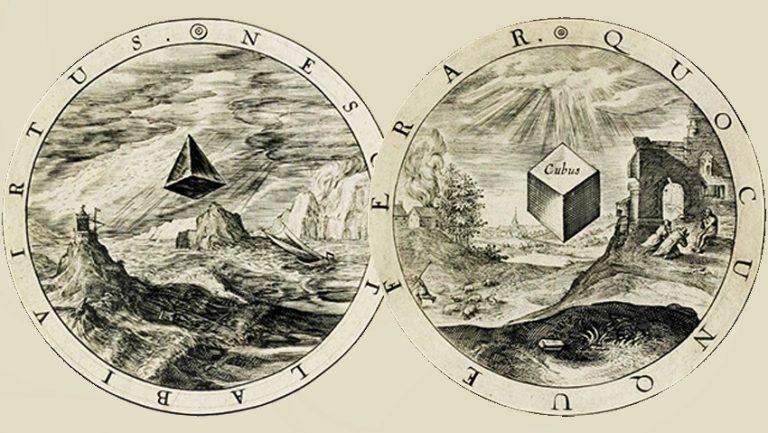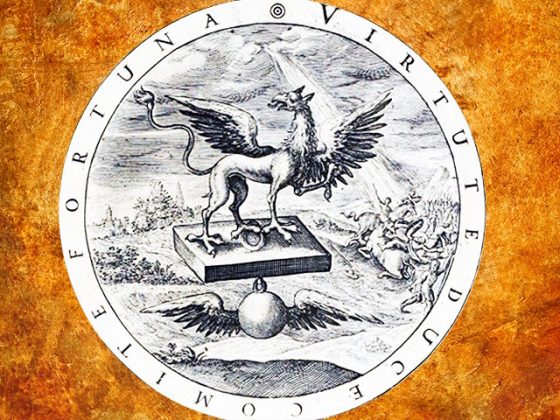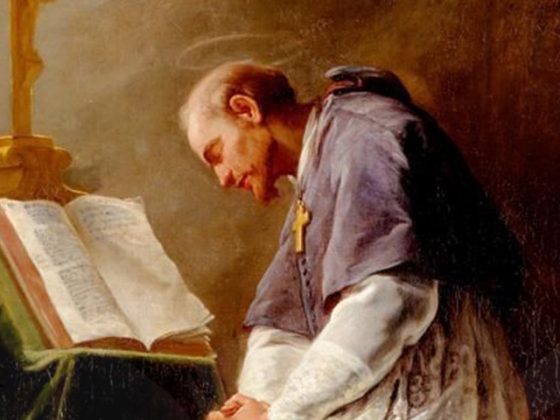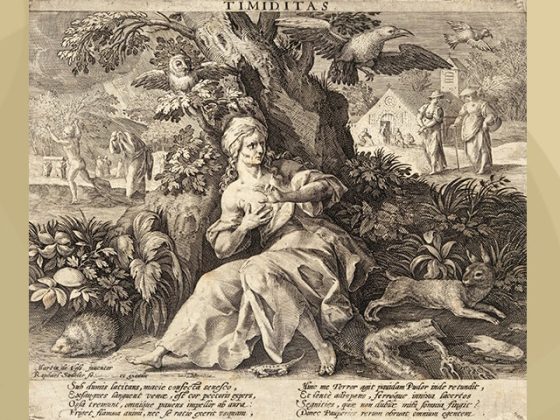Dearly beloved readers:
On this occasion I send you two emblems from the same book: Selectorum emblematum, with the text in Latin and Old French.
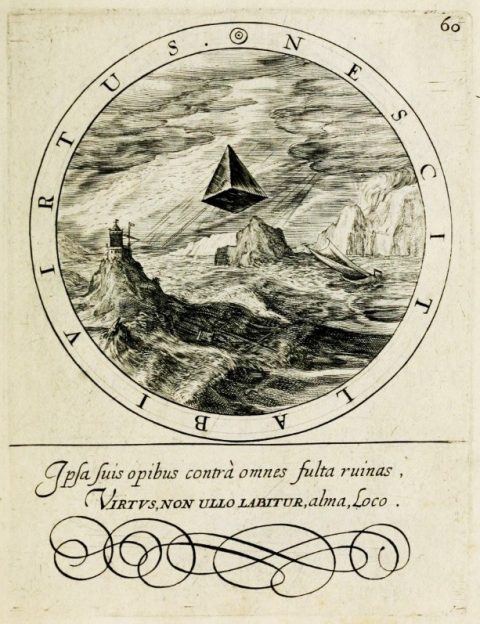
The first of these engravings is entitled…
…NESCIT LABI VIRTUS
─‘La virtud no sabe caer’─
This can also be translated as ‘Virtue cannot fall', or, a little more freely, ‘Virtue knows no falls'.
Below we have these other sentences:
Ipsa suis opibus contra omnes fulta ruinas
Virtus non ullo labitur, alma loco.
Meaning: ‘Sustaining itself through its works against all failures, virtue, benign, falls nowhere.'
Below we have this text in French:
Ainsy que toufiours droit se tient la chausse trappe
Ores qu´on la renversse et donne mile tours
Tout ainsy la verttu droicte fe tient tousiours
Soit que l´advesite par tous endroictes la frappe.
TRANSLATION: ‘Thus the caltrop always stands upright, even if it is turned around a thousand and one times. So too, virtue always stands upright even though adversity strikes it from all sides.'
What does all this mean, patient reader?
It is very curious to note that in this engraving virtue is represented by a giant triangle in the middle of the engraving. This triangle Gnostically represents the three primordial forces of creation: Holy Affirming, Holy Denying and Holy Reconciling.
Our Self-Realization is nothing else than the embodiment of these three forces in our animic and physical nature. This is our purpose for which we were brought into existence. It is therefore a matter of incarnating the force of the Father, the strength of the Son and the strength of the Holy Spirit. Unquestionably, we cannot do this overnight, it is a work that must take our entire lives to complete, culminating in what is known as THE GREAT INNER WORK.
That is why we see the triangle of our engraving suspended in the air and surrounded by a stormy wind that threatens to make it fall and self-destruct. However, as our engraving says, when our virtues are well strengthened, they do not yield to the storms of the Ego or even to the adversities of fate… It is obvious that, for a virtue to have been nourished with the necessary strength, we must have exercised it in our daily life through temperance, in other words, enduring all kinds of psychological gymnasiums that the labyrinth of our existence brings us every day… When someone loses their virtues, it is because there was really a lack of an in-depth understanding of them, and therefore the roots of those virtues were unable to withstand the vicissitudes to which they were confronted in the valley of existence…..
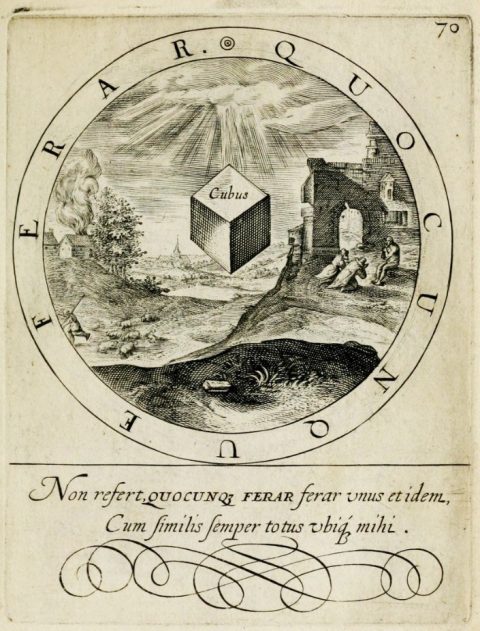
QUOCUNQUE FERAR
─‘Wherever it is taken’─
The word CUBUS that we see in the center of the image clearly means ‘CUBE'.
A Latin sentence tells us:
Non refert, QUOCUNQUE ferar unus et idem
cum similis semper totus ubique mihi.
Translation: ‘It does not matter, wherever I am taken I will advance one and the same, inasmuch as, wherever, everything is always like me.'
Another possible translation: ‘It does not matter, wherever they take me, I will remain the same, as I am always the same and whole everywhere.'
The Old French sentence tells us:
L'homme droit, et constant, doue d´une ame pure
ne change point de coeur par les malheureux traits,
comme le det quarre -carré-qui ne tombe jamais
quoy qu´on le gette -jette- au tour, que droit en sa posture.
Translation: ‘The upright and steadfast man, endowed with a pure soul, does not exchange his deep feelings for unfortunate characteristics. Like the solid work that never falls, no matter what happens, he remains upright in his stance'.
What mystery is taught to us in this other engraving, friends?
To begin our study we must observe that the central figure of our engraving is constituted by A CUBE that comes from the heavens. On the right side we see two characters who, kneeling, pray very concentrated, while a third character listens to them seated. On the left side we see a shepherd running and behind him his sheep. The trio of characters who pray alludes to the brothers who pray to heaven so as not to fall into temptation. That is our humanity that, immersed in its earthly impressions, eagerly seeks to be heard by the divinity.
On the other hand, the shepherd with his sheep flees terrified, fearful of that enormous cube that is looming over the world, that is, over the earth. Further in the background we see a house that is beginning to burn in flames. What is all this?
This shepherd symbolizes the enormous number of pseudo-spiritual characters who try to guide human societies, but they lack wise and explicit arguments about the problems of man and his development on the face of our world. In short, in uncertain situations they only know how to do one thing: flee from events and look for hiding places where they can take refuge.
The house that is engulfed in flames symbolizes our own society that, far removed from virtues, ends up being a victim of its own iniquities.
Having said that, the cube represents the PHILOSOPHER’S STONE, the BEING Himself. He is He, the divinity that dwells in our profundities and is immune to all adversities that creation presents anywhere on our globe. That is why in one of the above translations we are told: ‘It does not matter, wherever they take me I will remain the same, since I am always the same and whole everywhere.'
The BEING IS THE BEING, dear readers; He is the one who has been, who is, and who always will be for all eternity. THE BEING IS IMMUTABLE AND WILL ALWAYS BE ENDOWED WITH HIS OMNISCIENCE, OMNIPOTENCY AND OMNIPRESENCE, let us never forget that.
The BEING is the Father of all Lights, and the one who always holds the keys to the kingdom of the heavens. He is present in all the kingdoms of creation, for he is the very CONSCIOUSNESS of Nature, of the Universe, and of the Cosmos in general.
If we incarnate HIM we will eventually be part of His nature and He will make us immune to the falls of weak souls.
I now add a few quotations for your reflections:
“Gratitude is the main part of a good man.”
Quevedo
“Gratitude is the memory of the heart.”
Lao-Tzu
“It is right that those who receive some benefit, even if it is with childishness, should show gratitude.”
Cervantes
“No worthy man will ask to be thanked for something that costs him nothing.”
Terence
“Praising from the heart is a good deed; it is, in a way, participating in it.”
La Rochefoucauld
AD INFINITUM.
─'To infinity'─.
KWEN KHAN KHU


